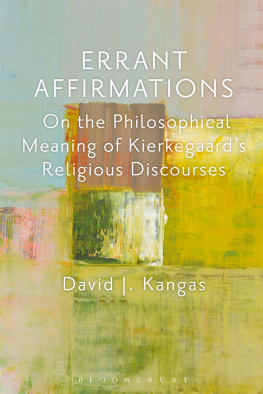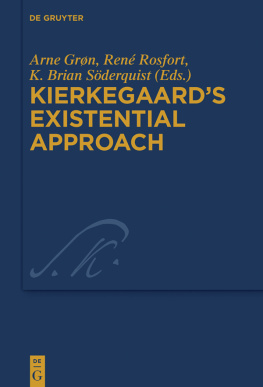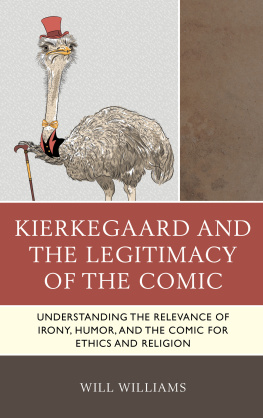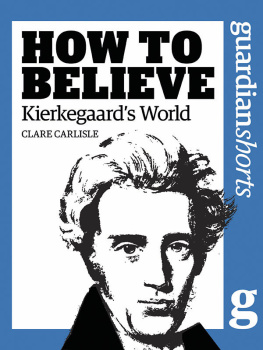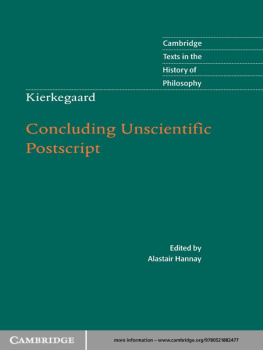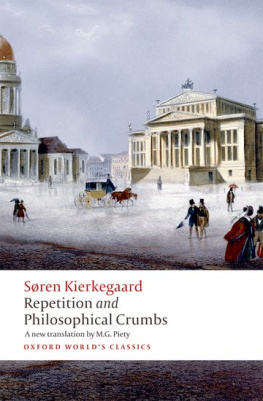
ERRANT AFFIRMATIONS
ALSO AVAILABLE FROM BLOOMSBURY
Becketts Words, David Kleinberg-Levin
Poetry and Revelation, Kevin Hart
The Ethics of Time, John Panteleimon Manoussakis

CONTENTS
I wish to acknowledge Alejandro and Daniela and Jason and Meg for their friendship in exigent circumstances. Thanks also to George Pattison and Vanessa Rumble for their support over the years and also to Jeffrey Hanson, editor of this series.
All of the translations in this book are my own. Citations are from the Danish Sren Kierkegaards Skrifter, abbreviated as SKS and referenced by volume number. I have also supplied reference to the English translation by Howard and Edna Hong with abbreviations as follows:
| EUD: | Eighteen Upbuilding Discourses |
| TDIO: | Three Discourses on Imagined Occasions |
| UDVS: | Upbuilding Discourses in Various Spirits |
| WO: | Without Authority |
Kierkegaard, like Nietzsche, was a brilliant polemicist. His polemic against speculative thought, prosecuted in the pseudonymous writings, grew to all-consuming proportions: he unleashed a scathing critique against the present age, the media, the established church, against Copenhagen itself. Neighbors turned hostile. His last years saw him on the streets handing out combative pamphlets. The polemical writings are indeed incisive and prescient in their fundamental No. Yet one cannot help but feel, after long exposure, something of the spirit of resentment animating them. They calculate their blows; they demand assent, even obedience; they conjure legions of followers and imitators, simultaneously denouncing and summoning their own herd.
As is known, however, Kierkegaard also wrote religious discourses (Taler) alongside the polemical writings. He signed these texts with his own name and financed their publication himself, overseeing every detail of the process: layout, binding, type of paper used, formatting and so on. His first book of discourses (Two Edifying Discourses, 1843), published to coincide with Either/Or, had a run of five hundred copies. By two years later it had sold two hundred and twenty-two copies; in the years 1844 and 1845 it sold only eleven and nineteen copies, respectively. It was basically the same for all the books of discoursesa wasteful economy, then. And yet it was in reference to these texts that Kierkegaard confided to his journal that he was overwhelmed with riches, that he could sit down and write for a day and a night and again for a day and a night, for there was wealth sufficient to it. He produced texts that were by his own reckoning superfluous, but in the way that a luxury is superfluous. The writing of the discourses was his luxury, his secret indulgence, his excess. To this day, however, these discourses mostly remain, unlike the polemical textswhich one might understand as his duty to the ageterra incognita, especially among philosophers.
That is perhaps not surprising, though. In the prefaces to the discourses Kierkegaard repeatedly refers to them as insignificant, comparing them to a little flower hidden in a great forest, which desire only to remain in the hidden, just as they came to be in concealment. So there is perhaps nothing to lament in their lack of reception. It would moreover be entirely misplaced, out of keeping with their spirit and the letter, for a book on the discourses to claim to fill a gap in the literature. Even so, for this reader, the discourses are the place where Kierkegaard ventures most freely in thought. What resounds is the affirmation that there is a today, with an infinite emphasis upon is. Todayis. To think with sufficient emphasis this conjuncture, this intensification of being, imposes the most rigorous demands on existence: to bloom like the lily, which neither toils nor spins, and to take wing like the bird, which neither reaps nor sows nor stores up in barns.
What follows is not a systematic exposition of the philosophical content of the religious discourses but rather a series of readings that follow a certain trajectory. A systematic exposition of a philosophy of the edifying discourses, while certainly possible, would be misplaced. The edifying discourse works like the work of art: in giving time and space to the gift of being they dilate the cramped attunement of the human being as informed by care, that is, by the project structure and the all-ravenous effort at knowledge, technique and manipulation. In this very dilation they create room to breathe, the very breath of affirmation. To read an edifying discourse is to find ones way, each time again, to that point from which the dilation spreads. Even if themes repeat, they can never be taken for granted or stabilized in a system; they must be uncovered again in their originality, starting from the horizon opened within the discourse itself.
The title of this book risks misunderstanding: what would a philosophical reading of Kierkegaards religious discourses amount to? Certainly not an effort to separate out some purely philosophical core from these writings, which would imply an artificial split between the philosophical and the religious. A philosophical reading will rather indicate the tracing of a problematic opening internal to the discourses themselves. Precisely in their character as religiousthough Kierkegaard will name them variously edifying, occasional, godly or Christianthe discourses achieve a philosophical radicality, an effort to think beyond the terms of the inheritance bequeathed by Descartes and repeated so profoundly in speculative idealism. It is not only a question of finding a decisive transcendental problematic concerning the subject at the heart of these textswhich there isbut of discerning in them a mode of affirmation that is oblique to discourses organized around knowledge. If one wishes an analogue to this problematicbut only thatit may be found in Plotinus separation of nous from logismos (of intellect or spirit from reasoning), or in Spinozas distinction between intuitive knowledge and discursive knowledge. The religious discourse is certain of the urgency of this distinction and knows where to place the emphasis.
Relevant to these distinctions is that, in his prefaces, Kierkegaard formulaically disavows experience with being, an experience inaccessible to because occluded by normalized modes of thought. This work is critical and phenomenological at its core.
Thus, all the discourses aim at an inversion of thought and speech in which familiar concepts are overturned in their normalized signification and are invested with a difficult and extraordinary sense. To read the discourses within an ethical or theological register, for example, would be to retreat to the horizon of authority that these discourses disavow. The key to reading the discourses is to find that fulcrum, that point where Kierkegaard gestures to a more originary undergoing of reality, where a certain violence done to ordinary concepts becomes necessary. The discourse says what ordinary language is not inclined to say. To read a discourse is to follow a conceptsuch as faith, patience or confessionas it is being born, in its repetition; it is to grasp it as it emerges out of an originary sense of what being signifies. Until one discerns why an inversion of thought and speech is necessary, why inherited concepts must necessarily burst, one has not read the discourse.
Next page
